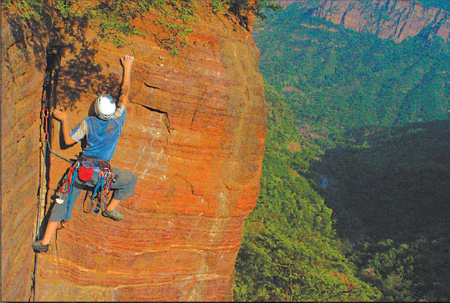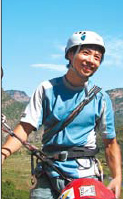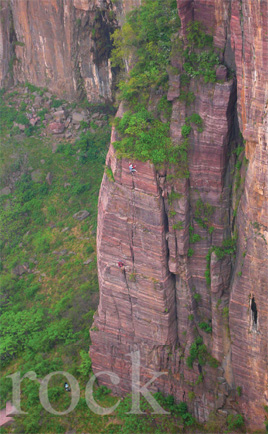-

Li Li scales a cliff in Guoliang, Henan province.
It's all teamwork
It was the photograph of a rock climber on a sheer cliff face, who, despite the danger, appeared to be relaxed, that inspired Li Li to scale greater heights.
"I was amazed someone could be so relaxed while hanging from a cliff, and I wished I could be like that, too," the 33-year-old recalls.
The Beijing-based art editor (pictured) started indoor training a year later and undertook his first outdoor expedition in 2005.
While scuttling up a bluff in 2007, he was suddenly overcome by a strange feeling, one of ambiguous but intense familiarity.
"It wasn't until later that I realized it was the same location that I'd seen in that photograph," he says.
"I even located the guy in the photo through the Internet and was surprised to find he was one of my friends. I think it was predestined."

He has since made climbing one of his priorities in life.
While some of his friends have chosen the pastime over their jobs, he says he seeks to strike a better balance in his quest for aesthetics.
"Scenery ranks higher than difficulty among our criteria for choosing places and routes," he says.
Li, who is known in the climbing community as "Yuanshangcao", or "Acao" (Grassy Expanse), makes an effort to document his excursions. He devotes much of his time snapping photos, writing blogs and developing new routes.
He also believes rock climbing helps him hone his problem-solving abilities.
"It's a comprehensive and objective activity that forces you to think from the gut," Li says.
He explains that when one climber can't figure out a way to tackle a route, often, another can.
"In other words, there are various solutions for a single difficult point," he says.
He says two types of achievements make climbing worthwhile - when he finally succeeds in scaling a route that he has failed to ascend many times, or when he makes it to the top on the first try.
Li recalls that it took him more than 20 attempts to scale one escarpment in Beijing's Baihe, in Miyun county, called "One Flew over the Cuckoo's Nest".
But Li says he doesn't use the word "conquer" to describe a successful trip up a formidable precipice.
"People can challenge themselves, but they can never conquer nature," he says.
Li explains that rock climbing requires constant self-cultivation.
"You hit bottlenecks after a certain period of time and won't pass through them unless you continue improving," he says.

Beijing-based editor Li Li crawling up a cliff in Guoliang, Henan province. Photos courtesy of Li Li
The most important thing is safety, a responsibility that enthusiasts collectively share, he explains.
Li has only taken one nasty spill, when he lost his grip and sustained severe rope burns to his feet, which took three weeks to heal. But he continued the climb after wrapping six adhesive bandages over the wound.
He also remembers a close call in which a climber in Yunnan's provincial capital Kunming pointed out that Li was securing his ropes to the wrong anchor for the route he was about to undertake.
"It could have been fatal," Li says.
That experience, he says, taught him a precious lesson: Prepare very carefully for any climb.
He also recalls an excursion in Guoliang, Henan province, during which he realized he had forgotten his climbing footwear after his partner had already ascended about 30 m.
"He had no choice but to toss his shoes down for me," Li says.
"We took turns wearing the shoes and climbing. But, for certain reasons, we didn't finish the route."
Beijing is home to several hundred climbing enthusiasts, part of a tightly knit community, he says.
"Some of my climbing pals have become my lifelong friends," Li says.
"Communication is the most important thing," he says.
Li has climbed about 70 percent of the major routes in Beijing and says he is eager for new spots to be developed around China.
Exploring these, he says, will take his passion for rock climbing to even higher places.
(China Daily 12/03/2009 page18)
